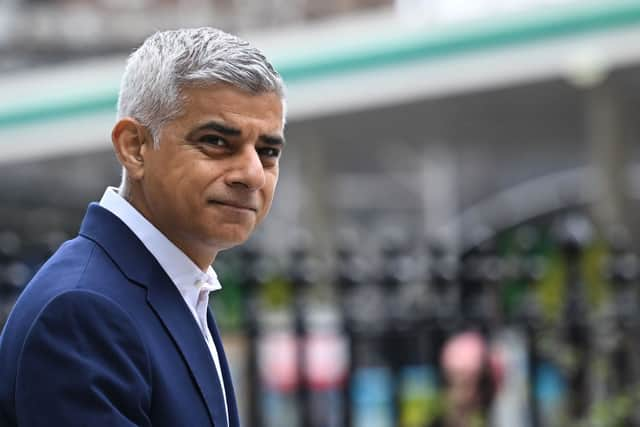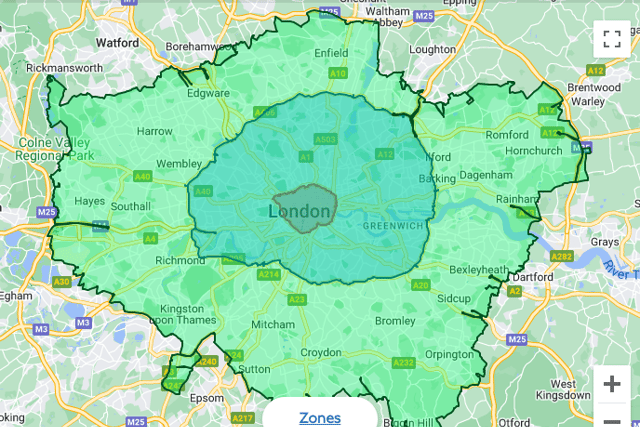ULEZ scrappage scheme: Londoners who bought compliant cars prior to scheme’s expansion won’t be reimbursed
and live on Freeview channel 276
Londoners who have already paid to replace their non-ULEZ compliant cars will not receive backdated support, Sadiq Khan has confirmed, as he unveiled a significant widening of the scrappage scheme.
Late last night (August 3), the mayor announced all of the capital’s residents with non-compliant cars and motorcycles will be eligible to apply for financial support. Prior to this, support for individuals was limited to those in receipt of certain low income or disability benefits, or child benefit.
Advertisement
Hide AdAdvertisement
Hide AdIncreased funding is also being made available for sole traders, small businesses, charities, and those with disabilities.
The move has come after a period of growing pressure on the mayor over the Ultra Low Emission Zone (ULEZ) expansion, which is due to incorporate the whole of greater London from August 29, following the Conservatives’ surprise hold of Uxbridge and South Ruislip in the recent by-election.
To fund the widening of the scrappage scheme, £50 million is being taken from City Hall’s reserves, upping the scheme’s pot from £110m to £160m.


Mr Khan told LondonWorld the scheme did not initially include all Londoners partially due to the need to support those on the lowest incomes and small businesses first.
Advertisement
Hide AdAdvertisement
Hide AdIt was then announced in June the scheme would be expanded the following month, due to there being a lot of money left in the pot, with the latest expansion also because finances have allowed.
He confirmed however that those newly able to apply for support under the expanded scheme who have already forked out for a new vehicle will not be reimbursed.
“What we can’t do is go back in time, whether it’s 2017 for the T-charge, 2019 for the Ultra Low Emission Zone in central London, the Ultra Low Emission Zone in inner London in 2021, or those who made plans before today,” he said.
Mr Khan however commended Londoners who have already purchased cleaner vehicles for doing “the right thing, because by getting a compliant vehicle they’re breathing in clean air. Their kids in the back are breathing in clean air. Those around them are breathing in clean air. So what we can’t do is go backwards.”
Advertisement
Hide AdAdvertisement
Hide Ad

‘Never been about raising revenues for TfL’
One question the expanded scrappage scheme poses is the potential impact on Transport for London’s (TfL) projected finances.
As previously reported by LondonWorld, the transport authority is expecting to make around £200m in the first year of the zone’s expansion, though this is estimated to drop significantly from then on.
The money made from the ULEZ, via the £12.50 daily charge for non-compliant vehicles, is to be invested directly back into TfL’s services, so improving the network.
In TfL’s 2023/24 budget, the income expected from the Congestion Charge, Low Emission Zone and ULEZ combined is around £150m more than the forecast for 2022/23, which is fed into the authority’s overall budget for the year.
Advertisement
Hide AdAdvertisement
Hide AdHowever, if more drivers are to be compliant from day one, will this have an impact on the authority’s finances?
Asked this question by LondonWorld, Mr Khan said: “The Ultra Low Emission Zone has never been about raising revenues for TfL, it’s been about cleaning up the air in London, saving lives, protecting kids’ lungs, and also tackling the climate emergency. Actually, the TfL commissioner wants there to be more compliant vehicles, so he receives less money, because it means cleaner air.”
The mayor added TfL’s books are “for the first time in history” due to record a surplus, though warned it continues to require support from government for capital projects.
According to TfL, more than 90% of cars seen driving in outer London on an average day are already ULEZ-compliant. However, data published by the Society of Motor Manufacturers and Traders (SMMT) indicates that when analysing vehicles registered to outer London addresses, this figure drops to around 83% for boroughs such as Sutton and Harrow.
Mr Khan recently won a High Court case in which five Conservative councils challenged the legality of the ULEZ expansion, and has said he is committed to rolling it out as planned on August 29.
Comment Guidelines
National World encourages reader discussion on our stories. User feedback, insights and back-and-forth exchanges add a rich layer of context to reporting. Please review our Community Guidelines before commenting.
